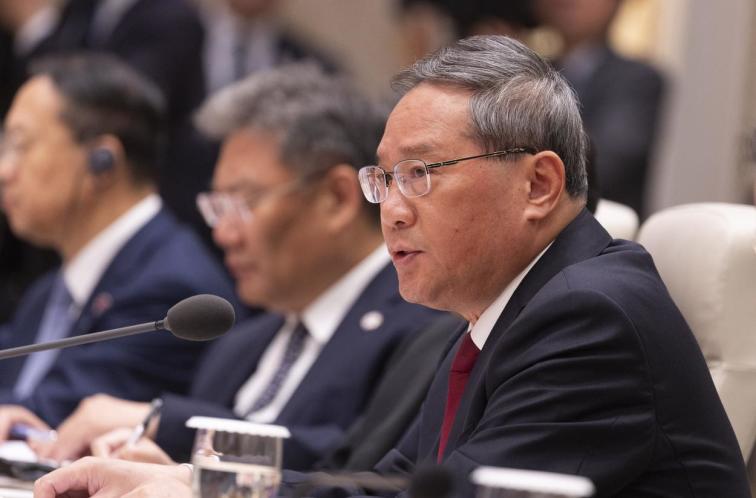Key officials under Xi Jinping frequently disappear. (Illustration by People News)
[People News] On July 30, the Chinese Communist Party (CCP) Central Committee convened a Politburo meeting, during which it was announced that the Fourth Plenary Session will be held in October. Whether this meeting will involve personnel changes at the top level of the Party has become a focal point of political discourse. Rumors regarding Xi Jinping’s waning power have been rampant recently. Some political commentators have proposed four possible scenarios regarding Xi’s future.
The Politburo meeting on July 30 confirmed that the Fourth Plenary Session will take place in Beijing in October, with the agenda focused on "formulating recommendations for the 15th Five-Year Plan for National Economic and Social Development."
However, the announcement made no mention of personnel adjustments, which has further fueled speculation.
Independent commentator Chen Pokong stated on his program that there are four possible versions of Xi Jinping’s fate at the upcoming plenary session:
-
The Most Conservative Scenario:
The session only addresses economic policies and general administrative issues, without touching on personnel matters. Xi remains in all his current positions: General Secretary, President, and Chairman of the Central Military Commission. There is no change in status. -
The Most Drastic Scenario:
Xi is completely removed from power, stepping down from all positions. This is considered the most desirable outcome both inside and outside the Party, domestically and internationally. -
The Partial Power Transfer Scenario:
Xi relinquishes part of his authority, such as stepping down as General Secretary, perhaps due to health problems, which would reduce his day-to-day workload. -
The Second-Line Leadership Scenario:
Xi neither fully steps down nor hands over official titles but retreats to a secondary role, taking on ceremonial or honorary positions. This would be similar to Mao Zedong’s retreat in the late 1950s and early 1960s, where Liu Shaoqi and Deng Xiaoping managed day-to-day affairs. In this version, figures like Li Qiang or Ding Xuexiang would be elevated to front-line leadership, while Xi focuses on recovery and self-preservation.
Chen Pokong believes all four versions are plausible. Based on the current information released from the Politburo, he predicts that Xi’s positions are unlikely to change, and he may remain in power until the 21st National Congress. However, if Xi refuses to step down and continues to resist the influence of retired Party elders (as reflected in the Beidaihe meetings), then China’s economic collapse will likely continue.
Political analyst Wen Zhao also noted that adjustments at the Fourth Plenary Session are inevitable, and categorised the possibilities into two main types: Plans involving major personnel changes; Plans involving no major personnel changes.
Wen Zhao stated that scenarios involving significant reshuffles cannot be predicted and must be analysed only after they occur. But if no major changes take place, it would indicate that Xi and his inner circle remain in full control.
According to Wen Zhao, the CCP’s priority will be "stability", though this refers not to social or economic stability but rather to the stability of the Party’s power. In times of crisis, the CCP’s mantra is: “Better death than chaos”—indicating a preference for repression over disorder.
As for reviving the economy, Wen Zhao argued that the CCP lacks a systematic and viable plan. The large-scale stimulus efforts launched in September of last year failed before they even took off. This year, China has also suffered under the strain of tariff wars, with the pace of change outstripping the response capabilities of the CCP bureaucracy. As a result, Beijing can only react piecemeal to problems as they arise.
On July 30, French international broadcaster Radio France Internationale (RFI) reported that Les Échos, a major French newspaper, published an opinion piece by veteran journalist Pierre Antoine Donnet. The article revealed signs of unprecedented tension within the CCP due to economic and political turmoil. While Xi Jinping still holds concentrated power, his autocratic style of governance has provoked dissatisfaction within the top leadership. Donnet believes Xi may be facing a gradual weakening of his authority and may be planning a slow exit from the stage.
Looking back, the Fourth Plenary Session of the 19th Central Committee was delayed nearly a year, which was widely interpreted as a sign that Xi was unable to achieve consensus within the Party, and that internal and external opposition forces were gaining momentum, posing a potential threat to Xi’s supreme position.
Historically, Fourth Plenary Sessions have been venues for major state policy decisions and even top-level personnel changes. For example, at the Fourth Plenary Session of the 13th Central Committee, Jiang Zemin was elected as General Secretary, while Zhao Ziyang was removed from his roles as General Secretary, Politburo Standing Committee member, Politburo member, Central Committee member, and First Vice Chairman of the Central Military Commission. At the Fourth Plenary Session of the 16th Central Committee, Jiang Zemin resigned as Chairman of the Central Military Commission, and Hu Jintao succeeded him.
(First published by People News)










News magazine bootstrap themes!
I like this themes, fast loading and look profesional
Thank you Carlos!
You're welcome!
Please support me with give positive rating!
Yes Sure!